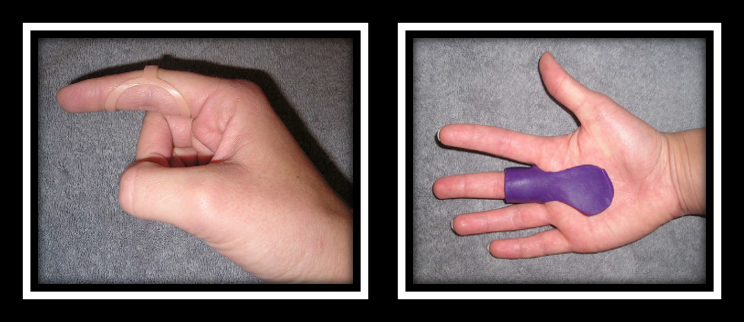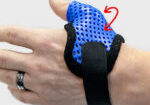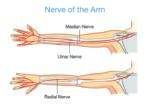Teo, S. H., Ng D. C., Wong, Y.K.(2018). Effectiveness of proximal interphalangeal joint blocking orthosis vs metacarpophalangeal joint blocking orthosis in trigger digit: A randomized clinical trial. Journal of Hand Therapy, 1-7.
The Skinny- This study compared PIP joint immobilization via an Oval-8TM with a custom MCP blocking orthosis in the treatment of trigger finger.

In the Weeds – Patient (n=35) with Trigger Finger (n=43) were analyzed. Twenty-three patients were allocated to the PIP joint splinting group and 20 patients were in the MCP splinting group. Patients wore the orthosis for eight weeks.
Pain reduction was observed in both groups, but pain reduction was greater with PIP joint splinting compared to the MCP joint splinting group (MCP joint splint). There was only significant improvement in QuickDASH for the PIP splinting Group. Patients wore the pip joint splint significantly longer during the day compared to the MCP splinting group (MCP splint), most likely due to improved comfort.
Bringing it Home- Findings suggest both orthoses are effective in reducing QuickDASH scores, reducing pain and improving overall trigger finger symptoms based on Green’s Classification. However, the pip joint immobilization splint was better for improved function and improved compliance.
The rationale for the rating. Small sample size. All patients with comorbidities were excluded limiting the generalizability of findings. Immobilizing the PIP joint compared to the MCP allows more function and improved compliance. When immobilizing the MCP you limit intrinsic grasp which is a necessity for function. The authors recommend wearing the orthosis for a 4-week duration of 24 hours in order to reduce triggering symptoms followed by night-time splint wear for another 3-4 weeks.
4 Comments
Leave a Comment
More To Read
CMC Arthritis Orthosis in the Hand: Mechanics and Purpose
One of the most common diagnoses we see in hand therapy is osteoarthritis of the 1st carpo-metacarpal joint where the metacarpal articulates with the trapezium. Also known as basal joint arthritis (CMC arthritis), this causes pain, joint deformity, loss of strength and loss of function. Patients come to us looking for relief of symptoms and…
Differentiating Proximal Median Nerve Entrapment from Carpal Tunnel Syndrome
By: Brittany Day Proximal Median Nerve Entrapment, Pronator Syndrome, or Lacertus Syndrome? Pronator syndrome is a term used to describe proximal median nerve entrapment (PMNE) in the forearm. Pronator syndrome and lacertus syndrome are sometimes used interchangeably to describe proximal median nerve entrapment distal to the ligament of Struthers and proximal to the flexor superficialis…
How to Strengthen the Intrinsics with Puttycise Tools:
How to strengthen the intrinsic with Puttycise tools
6 of our Favorite Adaptive Equipment Tools for CMC Osteoarthritis
Individuals struggling with osteoarthritis of the 1st CMC joint usually have difficulty with daily activities and it can become very frustrating. Everyday tasks such as cutting food, opening containers, and donning a button up shirt can become painful and slow. The largest contributor to the overall function of our hand is the thumb. If the…
Sign-up to Get Updates Straight to Your Inbox!
Sign up with us and we will send you regular blog posts on everything hand therapy, notices every time we upload new videos and tutorials, along with handout, protocols, and other useful information.







Trigger finger is easy to fix with surgery release. I’ve had it done. Piece of cake.
Have seen a pt lose a finger due to a freak release surgery accident. Have seen the scar tissue left behind following a surgical release replicate a trigger digit. Have seen conservative management effectively treat a trigger digit.
Even simple surgeries carry risks for pts, especially if there are preexisting conditions like diabetes or Raynaud’s. So maybe it is best to explore all aspects of treatment before throwing out a blanket statement, right?
why go to surgery before all conservative measures? Before surgery I would certainly consider CSI, which most times resolve the situation. another thing, is inflammation in the body due yo metabolic issues also need to be considered
What are some suggestions for pediatric trigger finger in the thumb?